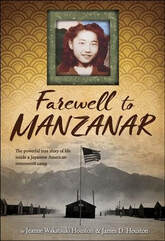
When Jeanne Wakatsuki Houston was seven, she and her family were forced by the American government to move from their comfortable home in Ocean Park, California, to Manzanar, a half-constructed camp in a mountainous desert region of California. They had committed no crime, but during World War II, a fear of Japanese spies swept the nation, and President Roosevelt signed an Executive Order permitting the relocation of any potential hazards to the country and/or winning the war. The Wakatsukis started off their three and a half years at the camp in half-finished shacks, and the food and conditions were appalling. But things improved, and eventually the camp grew to resemble an ordinary town, with movie theaters, churches, and schools. The camp became home, a place where Japanese heritage was not a curse.
Several years after it was founded, the camp was disbanded, following several court cases fought on the issue. Families which had been forced to move in were now being sent away, a sudden freedom which was no longer a blessing. People had built their lives only to be brought to the internment camps, their belongings hastily sold (or stolen) after they left. And now they were being thrust back into the outside world, with nowhere to start from, faced with widespread American anti-Japanese sentiment. For Jeanne, still a child, Manzanar was where her life truly began. For many, including her parents, it was the beginning of the end. No matter their age, the internees left the camp with scars that never fully healed, and memories, both good and bad, that haunted them for the rest of their lives.
To be honest, I can’t believe that this part of history isn’t more widely known. Most people haven’t even heard of the Japanese internment camps, or if they have, they don’t truly understand what happened to the people—elders, children, families—who were brought there. Farewell to Manzanar is especially powerful because it’s not just modern-day historical fiction, but the true story of a family’s experience, drawn from the author’s own memories. It’s a great book to discuss, and is an excellent choice for book groups. Thought-provoking and sometimes heartbreaking, I would highly recommend Farewell to Manzanar for readers ages eleven and up.
And if you’re interested in learning more about World War II, check out our review on Fly Girls!
 RSS Feed
RSS Feed
